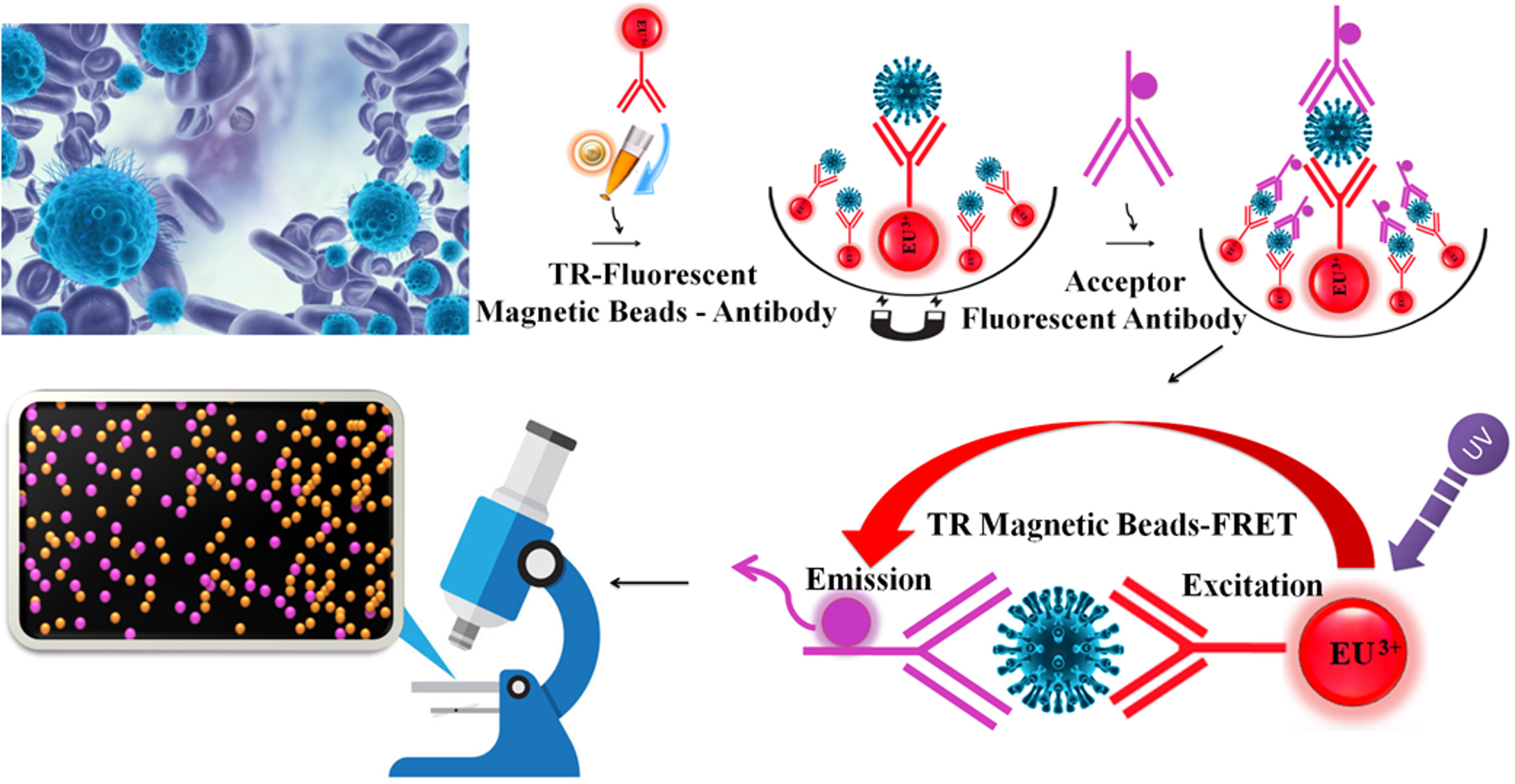- +1 858 909 0079
- +1 858 909 0057
- [email protected]
- +1 858 909 0079
- [email protected]

The BcMag™ TR-FRET Assay is a new and innovative tool for detecting trace amounts of analytes in a sample. It uses time-resolved fluorescence resonance energy transfer (TR-FRET) technology with magnetic beads as the donor fluorophore. This assay offers several advantages, including higher sensitivity, dependability, and higher throughput, making it a popular choice in high throughput screening.
Bioclone offers three unique types of Fluorescence Magnetic Beads, each with its own advantages and benefits. BcMag™ Europium Fluorescence Magnetic Beads, BcMag™ Terbium Fluorescence Magnetic Beads, and BcMag™ Ruthenium Fluorescence Magnetic Beads are uniform and monodisperse available in nominal diameters of 2.5µm and 5µm.
1.
Mix the antibody-conjugated donor beads with the cell lysates and incubate them with continuous rotation for a sufficient time. The beads remain suspended in the sample solution during mixing, allowing the target analytes to bind to the donor beads.
2.
After incubation, the beads are collected and separated from the sample using a magnet rack…
3.
Add the antibody-conjugated acceptor and incubate them with continuous rotation for a sufficient time.
4.
Analysis of TR-FRET measurements.

Fast and Efficient: The One-Step FFPE & FNA DNA Purification Kit is designed for efficient and fast extraction of total nucleic acids from FFPE tissues and FNA samples. The entire procedure can be completed in less than 30 minutes, and the kit can process more than 96 samples simultaneously.
The BcMag™ TR-FRET Assay provides ultra-sensitive detection limits of 10 pg/mL, compared to typical fluorometric detection limits of 100 pg/mL. This high level of sensitivity is essential for detecting trace amounts of analytes, which is often required in many life sciences applications. The assay is also highly resistant to photobleaching, resulting in more accurate data.
The high concentration of lanthanide chelates in the BcMag™ TR-FRET Assay results in a high fluorescence intensity. The lanthanide chelate has a high quantum yield, which increases the signal-to-noise ratio, making it easier to detect low levels of analytes.
The lanthanide chelates or cryptate used in the assay has large Stokes shifts, narrow emission bands, and long fluorescence lifetime. This reduces background fluorescence, resulting in a higher signal-to-noise ratio, making it easier to detect the analyte.
Many bioprocess ELISA assays can be converted to an HTRF assay, making it a versatile assay system. This is particularly useful for researchers and scientists who already have a library of bioprocess ELISA assays and need to switch to a more sensitive and robust assay system.
One of the significant advantages of the BcMag™ TR-FRET Assay is that it does not require washing steps. This reduces the time and complexity of the assay, resulting in a more efficient and streamlined workflow.
The BcMag™ TR-FRET Assay beads have a hydrophilic surface that can be grafted with different functional groups and linkers, allowing for efficient conjugation of various ligands. This makes it possible to detect a wide range of analytes, and the assay can be customized for different applications.
The magnetic properties of the BcMag™ TR-FRET Assay beads make them suitable for high-throughput automation. This makes it possible to process many samples in a short period, making the assay ideal for high-throughput screening applications.
In summary, the BcMag™ TR-FRET Assay provides many benefits and advantages over other assay systems. Its ability to detect trace amounts of analytes with high sensitivity, flexibility, and throughput makes it an ideal tool for researchers and scientists in the field of life sciences. By reducing false positive/negative results and providing accurate and reliable data, the assay can support research and development efforts in various fields.
Learn more
Magnetic Beads Make Things Simple